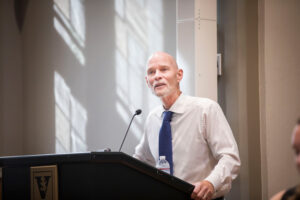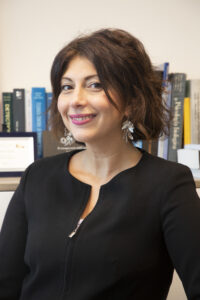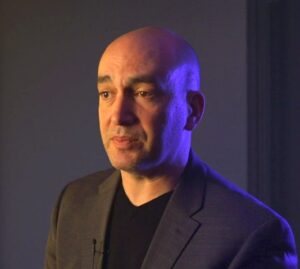MELD Team
Mark Wallace, Consortium PI

Mark T. Wallace is the holder of the Louise B. McGavock Endowed Chair in Neuroscience at Vanderbilt University. He is Professor of Psychology, Hearing & Speech Sciences, Pharmacology, and Psychiatry, as well as as well as a member of the Vanderbilt Brain Institute, the Vanderbilt Kennedy Center, and the Vanderbilt Vision Research Center. Dr. Wallace has served as the Director of the Vanderbilt Brain Institute and as Dean of the Vanderbilt Graduate School. He has received a number of awards for both his research and his teaching, including the Faculty Excellence Award of Wake Forest University, the Outstanding Young Investigator in the Basic Sciences and was named as the Frijda Chair in Cognitive Science at the University of Amsterdam in 2015. He is a fellow of the American Association for the Advancement of Science (AAAS) and a fellow of the Association for Psychological Science (APS). Dr. Wallace has an established record of research funding from the National Institutes of Health, the National Science Foundation and a number of private foundations, and is the author of more than 500 research presentations and publications. He currently serves on multiple journal editorial boards and is an officer in three scientific societies. His work has employed a multidisciplinary approach to examining multisensory processing, and focuses upon the neural architecture of multisensory integration, its development, its role in guiding human perception and performance, and changes in sensory and multisensory function in the context of aging, autism, dyslexia, and schizophrenia.
Monica Gori

Monica Gori is a tenured senior scientist at the Italian Institute of Technology (IIT), where she leads the Unit for Visually Impaired People (U-VIP) laboratory. Her lab comprises 12 Ph.D., 11 PostDocs, 1 Technician and 3 Affiliated Researchers. Monica Gori is an expert on development, multisensory integration, visual disability, and spatial perception.
She studied art at the Art Institute high school in Arezzo, then she graduated in psychology from the University of Florence in 2004 (cum laude). From 2002 to 2006 she worked at the CNR of Pisa in David Burr’s Laboratory. In 2008, she worked in Martin Banks lab (Berkeley, California). She received her Ph.D. degree in Humanoid Technologies from the University of Genoa and IIT in 2009 working with Giulio Sandini. During her Ph.D., she interacted with a robust multidisciplinary environment, starting collaborations with engineers and clinical institutes (e.g. Chiossone Institute and Stella Maris Institute). During this period, she started essential collaborations with Prof. Juergen Konczac (Minnesota University, USA) and Prof. Melvin Goodale (Ontario University, Canada). In 2013 she opened the visual-haptic lab within the Robotics Brain and Cognitive Science department and in 2015 she started the tenure track opening the U-VIP lab. In 2020, she became a tenured senior scientist. Monica is a recipient of the European Research Council (ERC) starting grant MySpace 2021 (~€1.5 million, www.myspaceproject.eu ) and ERC PoC iReach. She was the scientific coordinator of two large European grants, FP7 project ABBI (~€2 million, www.abbi.eu ) and Horizon-2020 project WeDraw (~€2.5 million, www.wedraw.eu ) and co-coordinator of the PNRR Raise Project (Spoke 1, ~€20 million). She is a partner in two ITN H2020 Marie Curie projects: MultiTouch and Optivist and a supervisor in the TIRESIA and Flex-U Horizon-2020 Global Marie Curie projects. She has coordinated as a principal investigator of several technology transfer initiatives, such as JOiiNT lab at Mondino Research Hospital San Martino Research Hospital and is the author of a patent. One of her papers has been listed in the F1000. She is a recipient of the TR35 Italian Innovation Award 2012 (price for young innovators), winner of the SmartCup in 2015, Finalist of the Engineering and Technology for the Falling Walls Science Breakthroughs of the Year 2021, recognized as “Expert” by Expertscape plans in 2021 ranked in the top1% of scholars writing about disabled persons in the past 10 years and listed in 100 Experts in 2016 in woman in science. In 2023 she received the important “Cuore Digitale” award for social technology. The impact of her work on the scientific community comprises 180 international papers, 8 book chapters, and more than 300 conference abstracts. Internationally accepted indices of impact and productivity show that her work has received 4843 citations, leading her to an H-index of 26 in Scopus and a 33 in Google Scholar.
David Lewkowicz

David J. Lewkowicz is a developmental psychobiologist. He earned his BA from Brandeis University in 1974 and a PhD in biopsychology from the City University of New York in 1979. He then completed a post-doctoral fellowships in child mental health at the Albert Einstein College of Medicine, Yeshiva University in 1980. His first academic position was as an Assistant Professor at Vassar College (1980-1982). He then moved on to a career as a research scientist, first at the Illinois Institute for Developmental Disabilities and the Northwestern University School of Medicine in Chicago, IL (1982-1987), and then at the New York State Institute for Basic Research in Developmental Disabilities (1987-2003). In 2003 Dr. Lewkowicz moved back to academia first as a full professor in the department of psychology at Florida Atlantic University (FAU) and the Center for Complex Systems and Brain Science at FAU (2003-2014) and then as a full professor in the department of Communication Sciences and Disorders at Northeastern University in Boston, MA (2014-2019). In 2019 Dr. Lewkowicz was recruited as a Senior Research Scientist at Haskins Laboratories in New Haven, CT with joint adjunct appointments in the department of psychology at Yale University and the Child Study Center in the Yale School of Medicine. Finally, in 2023 Haskins Laboratories transitioned into the Child Study Center in the Yale School of Medicine where Dr. Lewkowicz is currently a Senior Research Scientist and where he co-directs the LLAMB (Language Learning and Multisensory Brain) lab with Dr. Richard Aslin. In addition to these appointments, Dr. Lewkowicz has been an invited research scientist in the Laboratory of Developmental Psychobiology at the École Pratique des Hautes Études in Paris, France (1992), at the Centre Européen des Sciences du Goût in Dijon, France (2009), and in the Department of Psychology at the University of Padova in Italy (2019). For most of his career, Dr. Lewkowicz’s research program has focused on the development of multisensory perception, attention, processing, and integration in typically developing infants. More recently, this focus has expanded to include studies of the development of multisensory perception, attention, processing, and integration in typically developing young children as well as adults with a special emphasis on the role that multisensory processes play in the development of speech, language, and social communication. In addition, most recently, Dr. Lewkowicz has collaborated with colleagues at Yale in studies of the development of multisensory perception and its role in the emergence of language in children with autism. Over the years, Dr. Lewkowicz’s research has been supported by funding from the New York State Office of Mental Retardation and Developmental Disabilities, the March of Dimes Foundation, the National Institutes of Health, and the National Science Foundation. Currently, Dr. Lewkowicz serves on the editorial board of Developmental Psychobiology. Dr. Lewkowicz has contributed some of the first-in-the-field and foundational empirical findings on the emergence of multisensory perceptual skills in human infants, has authored and co-authored many articles and chapters, and has edited several books on development. Among his original scientific discoveries are that newborn infants can integrate auditory and visual information, that infants undergo a paradoxical process of perceptual narrowing of audiovisual integration, and that lipreading of audiovisual speech first emerges in infancy.
Micah Murray

Micah M. Murray is an American-Swiss neuroscientist. He earned a double BA from The Johns Hopkins University in 1995. In 2002, he received his PhD with honors in neuroscience from the Albert Einstein College of Medicine, Yeshiva University. He completed a post-doctoral fellowships at the University Hospital of Geneva, Switzerland. In 2003, was recruited to the University Hospital Center and University of Lausanne, Switzerland (CHUV-UNIL) for a faculty position within the Radiology and Clinical Neurosciences Departments. He also holds an adjunct professorship at Vanderbilt University (USA). He is the founding director of the Laboratory for Investigative Neurophysiology (the LINE) and served as the EEG section head of the CIBM Center for Biomedical Imaging (2007-2023). Professor Murray has a contiguous record of grant support from the Swiss National Science Foundation since 2004 in addition to numerous other foundation and industrial grants. He is the laureate of awards from the Leenaards Foundation, the Swiss Society for Biological Psychiatry, the Swiss National Science Foundation, and the Swiss Brain League. He currently holds editorial positions at Brain Topography (Editor-in-Chief), Neuropsychologia (Section Editor), and Current Biology (Editorial Board). Most recently, Professor Murray has conceived and established The Sense Innovation and Research Center, which is a joint venture of the CHUV, the UNIL, and the University of Applied Sciences of Western Switzerland (HES-SO) Valais/Wallis. Professor Murray serves as The Sense’s founding Scientific and Academic Director, which currently includes 16 principal investigators and their teams. Professor Murray’s own research focuses on developing brain imaging and mapping methods as well as their applications in both health and disease across the human lifespan. His scientific output includes more than 200 articles and book chapters. He has spearheaded advancements allowing for EEG to be used as a true neuroimaging technique. He has been a pioneer in characterizing brain mechanisms of human perception and in particular the ways that the senses appropriately combine information. This has led to a new schema of the functional organization of the brain and new approaches for screening and rehabilitation.
David Tovar

Nick Turk-Browne

Nick Turk-Browne is Professor in the Department of Psychology and Director of the Wu Tsai Institute at Yale University. He previously served on the faculty at Princeton University (2009-2017). He obtained an HBSc in Cognitive Science and Artificial Intelligence from the University of Toronto (2004) and a PhD in Cognitive Psychology from Yale University (2009). His research takes an integrative perspective, using behavioral studies, brain imaging, intracranial recording/stimulation, and computational modeling to understand how the human brain gives rise to cognition. He has published extensively on the learning mechanisms that transform perceptual experiences into lasting memories and the attention mechanisms that regulate this transformation. Most recently, his lab has conducted some of the first functional MRI studies in awake and behaving human infants. His work has been published in journals such as Science, Nature Neuroscience, and Proceedings of the National Academy of Sciences, and has been featured in The New York Times, The New Yorker, and The Atlantic. He has received funding from the National Institutes of Health, National Science Foundation, Templeton Foundation, James S. McDonnell Foundation, Intel Labs, and Meta Reality Labs. He received early-career awards from the American Psychological Association (2015), Vision Sciences Society (2016), Cognitive Neuroscience Society (2017), and Society of Experimental Psychologists (2018), and has been a Fellow of the Canadian Institute for Advanced Research since 2016.